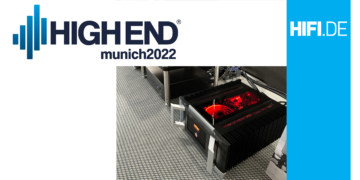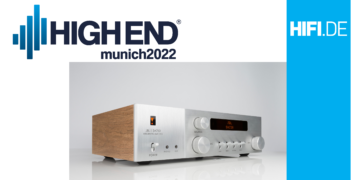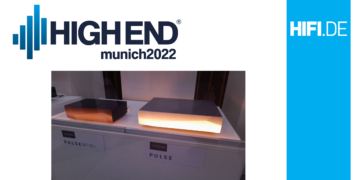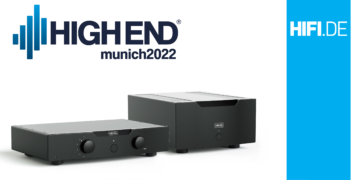| HIFI-FORUM » English » Stereo (Engl.) » quality of a copied cd vs the original | |
|
|
||||
quality of a copied cd vs the original+A -A |
||
| Autor |
| |
|
stonedsufi
Schaut ab und zu mal vorbei |
#1
erstellt: 13. Jul 2006, 07:11

|
|
|
Hi all, A copy (C) is made of an original CD(O). Will there be any difference between C & O ? bit is a bit and if they are not being copied properly or new bits are being added then if the stuff being copied was say software then the C will never work at all...! and then again bit is a bit.... no difference for a cd copier.. I am not at all clear about why there should be a difference in C & O  ? ?sufi |
||
|
anon123
Inventar |
#2
erstellt: 13. Jul 2006, 07:36

|
|
|
Hi, this question has been discussed ad nauseam in the German-language part of this forum. The gist of the argument is as follows: * If the copy made is bit-identical, then there is no difference between O and C. There has been some discussion as to whether some information ("some bits") may be "lost" in the copying process, on how to prevent this (automated O-C comparison), and on how CD-players handle this (error correction). * CD-Recordables obviously do have properties differing from factory-made music CDs. The main difference in audio application is its reflective capability. Some discussion has evolved about its effect on audio performance, and it is generally agreed-upon that modern CD-players should have no problems handling CD-Rs oder CD-RWs. Older players, however, do. * An attendant issue is copy speed. There is some substance to the argument that high speeds may impair readibility in audio players negatively, because "burning pits" is "deeper" at lower speeds. * Somewhat related is the dispute about so-called "audiophile" CD-Rs, alledgedly possessing distinct qualities that create audible differences from regular CD-Rs. This seems questionable at best, but perhaps there is a difference in reflective capability and durability. This discussion transgresses into the voodoo dispute. The bottom line is that O an C should be indentical using normal PC-based copying procedures. Differences may appear in the form of lost data. This lost data may at some stage be heard as "holes". Differences relating to the sound quality of the signal itself (regardless if complete or not) on balance appear speculative. Best. |
||
|
|
||
|
Shahrukh
Inventar |
#3
erstellt: 13. Jul 2006, 07:52

|
|
Keeping away from Os and Cs, my question would be How do I make my copy "bit identical"? Are slow burning speeds the only way? |
||
|
bhagwan69
Inventar |
#4
erstellt: 13. Jul 2006, 07:55

|
|
|
I have tried several times to copy CD's & play them on a 'high-end' set up. I have even used same CD Players & same Cables through 1 pre amplifier & the rest of the chain being common. The DIFFERENCE IS THERE !! You can immediately tell. Forget playing coppied or burnt or toasted CD's. Even if you play 'original' CD's from the same company but pressed at different times, they sound so different, even through the same glass master may have been used. I advocate very strongly that Coppied / Burnt / Toasted CD's can never sound the same as the original. i.e. if you have a set up that can show you the difference. Any average 'mid-fi' set up will easily be fooled ! Bhagwan69 |
||
|
Shahrukh
Inventar |
#5
erstellt: 13. Jul 2006, 08:05

|
|
|
Au contraire, Bhagwan - my 'burnt' copies of DS Brothers In Arms disc sounds better than the original. Though the 'original' is supposed to be remastered, Super Bit Mapped and what not... it still sounds harsh when compared to my copy. |
||
|
stonedsufi
Schaut ab und zu mal vorbei |
#6
erstellt: 13. Jul 2006, 08:41

|
|
|
if that is the case that even originals from different batch sound dissimilar then what exactly is an original? Which one will be the benchmark... Only anon123 makes some sense and therein too I am a little wary of accepting that the depth of pits will make much of a difference -  http://www.cdrfaq.org/faq02.html#S2-52 http://www.cdrfaq.org/faq02.html#S2-52"CD-Rs and CD-RWs don't have "pits" in the same sense as pressed CDs. If the material were burned away, you'd get a distinct odor from your CD recorder as the combustion by-products escaped. If the burned material were trapped in the CD, it would probably rupture the lacquer coat (converting solid matter to gaseous form rapidly is commonly known as "exploding"). It's not accurate to describe a recorded CD as having "deep" or "shallow" pits, because it doesn't have pits at all. The organic dye or phase-change film changes state in a way that affects how light is reflected. The result in a CD player is the same, though the peak reflectivity may be different. You will get different results from different read heads though, e.g. DVD players have trouble reading CD-Rs, but rarely have problems with CD-RWs and pressed CDs. Incidentally, it's not desirable to have "deeper" pits in a pressed CD. The depth of the pit is chosen to cause a 1/2 phase difference in the reflected light. If the pit were shallower or deeper, the effect would be lost." |
||
|
Amp_Nut
Inventar |
#7
erstellt: 13. Jul 2006, 08:50

|
|
|
First of all let me openly state that I support Bhagwan69's views. Hence my (current ? ) thinking and arguments are skewed in that direction... 
A VERY good question. In fact, I would like to throw the question Back to the forum again : How do I make my copy "bit identical"?  While burning speed is a factor, it comes in AFTER the data has been read off the original to begin with ! 1. So we need a software to read the Original VERY, VERY well, so well, that infact, there are ZERO errors... atleast no errors that the fairly poor CD Audio correction scheme cant correct. If read errors occur, the software needs to go and re-read the same sectors, till a perfect read is obtained. EAC (Exact Audio CD ) a freeware does this.... It even has a 'Paranoid Mode' that will go ALL out to minimise read errors. 2. SAVING THE BITS READ The bits read off, are saved on the Hard Disk ( HDD). If real time read - write is performed, then there is little scope for re-reading a bad sector repeatedly. I have always been saving the bits on my HDD as a wav file. I have however realised that the music on the CD is NOT in the wav format at all ! ( Is this true ? Can someone clarify ? )  Oh ! So what EAC does for me is to read the bits Almost perfectly, and then REARRANGE them, in a COMPELETY DIFFERENT arrangement ! ?  I refuse to believe that the change in file format to wav, does not introduce its own errors. ( Try changing a picture file from tiff to bmp or jpg or gif ) However, this is not my area of expertise, and I would love to hear from someone more knowledgeable.  The other way is to create a Disc Image, and then copy the disc Image. I do not know if the Disc Image retains the 0s & 1s in Exactly the same sequence as on the master ? Can someone knowledgable advice ?    Thanks |
||
|
stonedsufi
Schaut ab und zu mal vorbei |
#8
erstellt: 13. Jul 2006, 09:05

|
|
|
My point is simple... lets take this topic away from music duplication and towards software duplication. If i were to create an image of a software and burn the same and if there some bits that were not read properly or missed then would the software work at all? In that particular sectore the index will say something and the actual will not measure up and will show up as an error!! on that particular index will the reading continue??? Shy would it be any different for Music?.. bit is a bit is a bit....still learning about how stuff is crammed on to the disk... so will post whenever i read anything relevant.. |
||
|
Amp_Nut
Inventar |
#9
erstellt: 13. Jul 2006, 09:06

|
|
|
Hello anon123 Thanks for your very concise post, and for sharing with us, the discussions on the German forum, which we have not been able to follow, due to differences in language. This topic interests me a great deal, and I do hope that we can discuss this here, un-emotively, without retorting to 'Voodoo.'  |
||
|
Amp_Nut
Inventar |
#10
erstellt: 13. Jul 2006, 09:12

|
|
|
stonedsufi said
Data and Music are 2 TOTALLY Different fish.... Data, when written & Read off a CD, deploys a MUCH MORE Powerful error correction, than Music written onto a CD. |
||
|
Shahrukh
Inventar |
#11
erstellt: 13. Jul 2006, 09:14

|
|
Why? How? |
||
|
Amp_Nut
Inventar |
#12
erstellt: 13. Jul 2006, 09:41

|
|
|
Shahrukh, Good questions. 1. I have participated in a similar discussion on the Stereophile forum, and there, Franke gave some Superb info. Do check out the thread at :  http://forum.stereop...ain=6676&type=thread http://forum.stereop...ain=6676&type=thread2. To answer your question, I am quoting below, from FrankE's post ( Hope I am not accused of piracy .. ) 
|
||
|
Amp_Nut
Inventar |
#13
erstellt: 13. Jul 2006, 09:45

|
|
|
Another Post from FRANKe, on the Stereophile Forum discussion thread :
[Beitrag von Amp_Nut am 13. Jul 2006, 09:46 bearbeitet] |
||
|
Amp_Nut
Inventar |
#14
erstellt: 13. Jul 2006, 09:55

|
|
|
Sharukh, some more 'dope' for you The PX Scan site, has an informative manual.... Here is an exerpt that is technical but informative anyway : Quote: 2.1 Errors on CDs When scanning a CD for errors, you get several error values: C1, C2, CU12. In order to understand what those numbers mean and how to judge whether or not a CD has been recorded at good quality, you need to understand, at least a little bit, how data on a CD is arranged and protected against damage. A CD consists of sectors of 2352 bytes each. A sector is split into 98 groups of 24 bytes each. For each of those groups 4 bytes are calculated and used for C2 error correction. Then, after moving around some data, 4 more bytes are calculated for each group of 28 bytes and are used for C1 error correction. When reading a CD, there are 32 bytes (24 + 4 + 4) in each of the 98 groups. If one bytes is damaged, you have an E11 error, if 2 bytes are damaged, you have an E21 error, if more than 2 bytes are damaged, you have an E31 error. E11 and E21 errors are guaranteed to be corrected using C1 error correction only. If there are more damaged bytes, the result after doing this & 'moving around; backwards is that those errors are then distributed over several groups of 28 bytes each, hopefully with not more than 2 errors per group. One error in such a group is called an E12 error, 2 errors are called an E22 error (also called C2 error), more than 2 errors are called an E32 error (also called CU error). On audio CDs, an E32 error means that error concealing techniques might be necessary in order to minimize the risk of ticks and clicks on playback. Thus, an audio CD that contains E32 errors could be damaged beyond repair (the original data cannot be retrieved anymore) and should immediately be backuped. A CD containing E22 errors but not E32 errors is not yet damaged beyond repair, but you might want to make a backup before E32 errors show up. On data CDs, there is a third layer of error correction (that's why you only have 2048 bytes of data in one sector of a data CD), so that a certain amount of E32 errors can still be corrected. On CDs, error measurement is usually performed over an interval of one second, which equals 75 sectors. Very good discs can show an error rate below one C1 error per second and no C2/CU errors. Clearly, its not just that 200 errors per second will be corrected. If the errors are sequential, as explained above, C-1 & C-2 just cant handle it.... Iformation Overload ?   [Beitrag von Amp_Nut am 13. Jul 2006, 10:12 bearbeitet] |
||
|
Arj
Inventar |
#15
erstellt: 13. Jul 2006, 09:57

|
|
actually there is a difference in recordings and it leads to something called JITTER. The problem is not in the difference in images but in the way it is interpreted by the reader which is mechanical/electronic. hence the reason why a good CD writer like Plextor et al output a better written CD than say an entry level vague one. entry level CDPs do not have a very good error correction and hence if the bits are not well formed in the cd a 0 or a 1 may not be read correctly as the signal may lie in the grey area of the Threshold limit and thus be read either way. some high end transports like meredian actually read the cd multiple times and uses error correction to remove these errors and hence sound more analogue. (Hence the slow startup time) if you use a very good ripper like EAC, it has a strong error correction built in which corrects any error caused due to the CD reader. to summarize. 1. yes digital images are identical only IF the CD has been well "burnt" AND the reader used to create the image has error correction to correct for reader error 2. Most entry level/mid fi cdps do not do the best job of reading CDs especially in those areas where the read value is in a "grey area" for deciding on the signal. IMHO thats why a CDR can sound better than the original cd.. it is not purely due to the cd but due to the reader as well. [Beitrag von Arj am 13. Jul 2006, 15:37 bearbeitet] |
||
|
Shahrukh
Inventar |
#16
erstellt: 13. Jul 2006, 10:56

|
|
Thank you! Thank you! Thank you! This is all very informative. And interesting!  |
||
|
Jeeves
Stammgast |
#17
erstellt: 13. Jul 2006, 13:01

|
|
|
Bhagwan said 'I have tried several times to copy CD's & play them on a 'high-end' set up. I have even used same CD Players & same Cables through 1 pre amplifier & the rest of the chain being common. The DIFFERENCE IS THERE !!' The critical words here are high end set up. The average set up may not be so ruthless. Jeeves |
||
|
bombaywalla
Stammgast |
#18
erstellt: 13. Jul 2006, 13:19

|
|
|
My experiences w/ CD-Rs have been quite different from what Bhagwan69 & Amp_Nut have experienced: I've found that my CD-Rs are usually better than the original copies esp so if the music is Rock. I've used a very good computer CD burner from TEAC (that I eventually fried over a period of 3 years  ) & these days I use a Yamaha CRW F1. ) & these days I use a Yamaha CRW F1. The Yamaha allows me to burn the CD-R with longer & deeper pits at the expense of recording only 62 minutes on an 80 minute disc. The quality of the music is better than the original. I rip using EAC & usually burn at 1X speed. Even a CD burnt using the regular length & depth of pits w/ the Yamaha sounds better than the original! The only time I found the CD-R not as good was for XRCD originals. I have not tried burning classical music as I do not listen much to this genre (as yet). |
||
|
anon123
Inventar |
#19
erstellt: 13. Jul 2006, 15:32

|
|
|
Hello again, I'm glad I could be of a little help in this, although I'm not a tech expert at all -- as you can easily tell. Over in the "German part", people have discussed this issue frequently along the lines addressed. The discussion is usually inconclusive, the only result apparently being that at some point people get "personal" with each other. I am all the more happy to see that the discussion here is very civil and content-oriented. Thumbs up for this. As for me, I have never been able to tell any difference on my reasonably good Rotel/B&W system. This is not to say that differences do not exist. I've just never made a true A/B "blind" comparison. While I do have an open mind about this, I honestly rather concentrate on enjoying music in good sound quality on my system. Original or copy -- I have thus far been quite satisfied. Keep up the fine discussion and best wishes. |
||
|
sanathan
Ist häufiger hier |
#20
erstellt: 13. Jul 2006, 16:57

|
|
Its very easy to verify bit precision you do not need high end audio setups to test the same. Take the original cd burn it as an image (iso or nrg in nero or whatever) Do the same process with the original. Now compare both the images with a binary diff utility. If they are bit identical you will see no diff Although i myself did not do it, I heard if the copy is good (normal pc , reasonably good cd not cheap ones).......there WILL not be any difference.... Maybe cheap quality cd "duplicate" may detoriate more faster than the original one.. and who says the audio company is suing a better cd to record???? |
||
|
Amp_Nut
Inventar |
#21
erstellt: 14. Jul 2006, 02:43

|
|
|
Hi Sanathan, Can you provide me the name of a Binary Diff Utility ? Preferably a Freeware or shareware ? Thanks |
||
|
sanathan
Ist häufiger hier |
#22
erstellt: 14. Jul 2006, 06:00

|
|
|
Hi, You can try this  http://www.fairdell.com/hexcmp/ http://www.fairdell.com/hexcmp/or for freeware try this :  http://home.comcast.net/~chris-madsen/vbindiff/ http://home.comcast.net/~chris-madsen/vbindiff/I have done the comparision myself : 1) I used two different drives to create an ISO/NRG Image file for the same cd and there were a lot of differences 2) When i create image using the same drive two times and compare them they are exactly identical . when i rip into wav from both the drives separately , there is a difference . I am confused wether there is a padding bits difference or genuine read difference.... |
||
|
Amp_Nut
Inventar |
#23
erstellt: 14. Jul 2006, 06:54

|
|
|
Hope to try it this weekend. However my priority for the weekend is to install a new monster ( 240GB ) HDD I got from Singapore for approx Rs 4300. Thanks for the pointer, and the info on comparisions. |
||
|
bhagwan69
Inventar |
#24
erstellt: 14. Jul 2006, 10:01

|
|
|
I had used a Gamut CD Player with a Transparent Digital Interconnect burning into a Pioneer CD Burner. This used to use the expensive CD's as blanks - not the regular Rs. 5 to Rs. 10 computer cd's. Burning speed was 1 X. Yet, the fianl result was in no way close to the original. Just wanted to express my experiance.  |
||
|
sanathan
Ist häufiger hier |
#25
erstellt: 15. Jul 2006, 07:05

|
|
|
I got it . 1) Look at this :  http://www.blazeaudi...t_topic&f=4&t=000006 http://www.blazeaudi...t_topic&f=4&t=000006
As i guessed it is an offset difference not difference in the wav data 2) This i have found will give exact copies : it will let you check all the errors and lets you know if an error uccurs . You can use your drive in "accurate copy mode" It takes almost double the time of ordinary rippers but it is worth it:  http://www.exactaudiocopy.de/ http://www.exactaudiocopy.de/ |
||
|
sanathan
Ist häufiger hier |
#26
erstellt: 15. Jul 2006, 07:59

|
|
|
The is a way to compare wave files for audio data in EAC Tools --> COmpare wav I got 96 sample missing from position 00:00:00 and that is the offset since different drives start the track at a little offset . Since cd is 44100 sample per sec that is perfectly fine (it may be silence info) . ANyhow now i get bit identical results from 3 different drives using EAC ..... :-) |
||
|
Debu
Ist häufiger hier |
#27
erstellt: 16. Jul 2006, 18:14

|
|
|
Hi, There are some software that claims to actually repair DVDs while copying (Limited error correction for scratched DVDs), check this url:  http://www.lgsoftwareinnovations.com/1clickdvdcopy.asp http://www.lgsoftwareinnovations.com/1clickdvdcopy.aspPls try it folks. Cheers, -Debu |
||
| ||
|
|
||||
| Das könnte Dich auch interessieren: |
|
cd sound quality filmguy am 11.04.2005 – Letzte Antwort am 12.04.2005 – 9 Beiträge |
|
VCD vs Audio CD !!!! abhi.pani am 22.03.2005 – Letzte Antwort am 23.03.2005 – 3 Beiträge |
|
Stereo sound quality of the NAD T-523 Maerten am 08.02.2004 – Letzte Antwort am 10.02.2004 – 4 Beiträge |
|
Do CD Players make The LEAST Difference In Sound Quality ? Amp_Nut am 11.04.2008 – Letzte Antwort am 15.04.2008 – 42 Beiträge |
|
A labour of Love Savyasaachi am 08.02.2006 – Letzte Antwort am 14.02.2006 – 11 Beiträge |
|
cost of material vs the cost of final product hojo am 25.05.2006 – Letzte Antwort am 26.05.2006 – 14 Beiträge |
|
The joy of a sub in the Loop benkenobi am 30.04.2005 – Letzte Antwort am 01.05.2005 – 6 Beiträge |
|
Balanced VS Unbalanced Outputs Inor am 13.10.2005 – Letzte Antwort am 13.10.2005 – 4 Beiträge |
|
Studio Monitors Vs. Bookshelf Speakers: What's the difference? SDhawan am 12.09.2006 – Letzte Antwort am 20.09.2006 – 64 Beiträge |
|
HDCD Vs DDD abhi.pani am 08.12.2006 – Letzte Antwort am 10.12.2006 – 24 Beiträge |
Foren Archiv
2006
Anzeige
Produkte in diesem Thread

Aktuelle Aktion
Top 10 Threads in Stereo (Engl.) der letzten 7 Tage

- Good speakers for old system
- Jamo Concert E750 and E770
- Replacing Stock Jumpers on NAD/Marantz
- FYI: Cadence latest price list
- One speaker "louder" than the other?
- TNT triple T loudspeaker cable
- Vincent SV 231
- Planar speakers
- Best Amp for Quad 11L? Nad vs Rotel vs Marantz vs CA
- Is Jamo E-series worth it?
Top 10 Threads in Stereo (Engl.) der letzten 50 Tage

- Good speakers for old system
- Jamo Concert E750 and E770
- Replacing Stock Jumpers on NAD/Marantz
- FYI: Cadence latest price list
- One speaker "louder" than the other?
- TNT triple T loudspeaker cable
- Vincent SV 231
- Planar speakers
- Best Amp for Quad 11L? Nad vs Rotel vs Marantz vs CA
- Is Jamo E-series worth it?
Top 10 Suchanfragen

Forumsstatistik

- Registrierte Mitglieder930.688 ( Heute: 6 )
- Neuestes Mitgliedmaggiekauper70
- Gesamtzahl an Themen1.563.519
- Gesamtzahl an Beiträgen21.827.700












